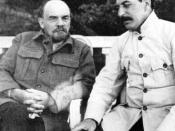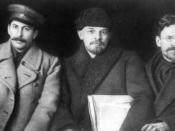Between 1917 to 1934, the Soviet Union was run through Marxist-Leninist Ideology. Although Lenin and Stalin deviated from Marxist thought; the NEP, collectivisation and industrialisation, LeninÃÂs first decrees and War Communism still followed the main principles that were administered by Marx and Engels in 1850. The Soviet communist movement was in itself an experiment as Lenin and Stalin adopted different methods to overcome the shortfalls of the communist system. Although the Soviet Union was not a communist state, as it did not reach the stage of a future classless Utopian society by 1934, the Party still established and consolidated its own manufactured version of Communist Ideology over the Soviet population.
Communism is a system that advocates a future, classless, Utopian society where the means of production would be shared by the population but by 1934, the Soviet Union and the Communist Party had not achieved this stage. However, according to Marxist theory, LeninÃÂs policies did in part follow the policies that Marx advocated almost seventy years before the October Insurrection.
Marx believed that in order to create a communist state, a ÃÂdictatorship of the proletariat,ÃÂ was required beforehand. The basis of LeninÃÂs policies between 1917 ÃÂ 1921 and later StalinÃÂs policies from 1929 onwards clearly encompassed the notion that Marx advocated in the Communist Manifesto of 1848. However, Lenin and Stalin also deviated from Marxist thought during certain periods of Soviet history.
The October Insurrection brought in Bolshevik Communist Rule in 1917. However, according to Marxist theory, the consolidation of power did not here to Marxist ideology. According to Marxist theory, a long series of proletariat revolution was necessary before the capitalist system could be overthrown. This idea was advocated by the Mensheviks and the Social Revolutionaries, who preferred a sharing of government roles between the Provisional Government and...


